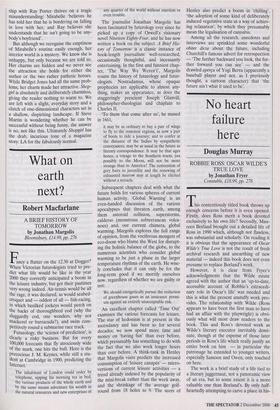What on earth next?
Robert Macfarlane
A BRIEF HISTORY OF TOMORROW by Jonathan Margolis Bloomsbury, £14.99, pp. 276 Fancy a flutter on the 12.30 at Dogger? When Victorian futurologists tried to pre- dict what life would be like in the year 2000 they correctly anticipated a boom in the leisure industry, but got their pastimes very wrong indeed. Air-tennis would be all the rage, it was declared, as would seabed- croquet and — oddest of all — fish-racing, in which besilked jockeys would perch on the backs of thoroughbred cod (why the sluggardly cod, one wonders, why not mackerel or barracuda?), and swim com- petitively round a submarine race track. Futurology, the 'science of prediction', is clearly a risky business. But for every 100,000 forecasts that fly atrociously wide of the mark, one hits the bull. Here is the precocious J. M. Keynes, while still a stu- dent at Cambridge in 1900, predicting the Internet:
The inhabitant of London could order by telephone, sipping his morning tea in bed, the various products of the whole earth and by the same means adventure his wealth in the natural resources and new enterprises of any quarter of the world without exertion or even trouble.
The journalist Jonathan Margolis has been fascinated by futurology ever since he picked up a copy of Orwell's visionary novel Nineteen Eighty-Four, and he has now written a book on the subject. A Brief His- tory of Tomorrow is a classic instance of book-length journalism: well-researched, occasionally thoughtful, and incessantly entertaining. In the first and funniest chap- ter, 'The Way We Weren't', Margolis roams the history of futurology and futur- ologists. Nostradamus, whose opaque prophecies are applicable to almost any- thing, makes an appearance, as does the staggeringly prescient Joseph Glanvill, philosopher-theologian and chaplain to Charles II.
'To them that come after us', he mused in 1661,
it may be as ordinary to buy a pair of wings to fly to the remotest regions, as now a pair of boots to ride a journey; and to confer at the distance of the Indies by sympathetic conveyances, may be as usual in the future as literary correspondence. It may be that ages hence, a voyage to the Southern tracts, yea possibly to the Moon, will not be more strange than to America? The restoration of grey hairs to juvenility and the renewing of exhausted marrow may at length be elicited without a miracle.
Subsequent chapters deal with what the future holds for various spheres of current human activity. 'Global Warning' is an even-handed discussion of the various apocalypses that threaten earth, among them asteroid collision, superstorms, calderas (monstrous subterranean volca- noes) and, our current chimera, global warming. Margolis explores the full range of opinion, from the vociferous mongers of eco-doom who blame the West for disrupt- ing the holistic balance of the globe, to the numerous scientists who consider global warming to be just a phase in the larger temperature rhythms of the earth. He wise- ly concludes that it can only be for the long-term good if we mortify ourselves now, regardless of whether we are guilty or not:
We should energetically pursue the reduction of greenhouse gases as an insurance premi- um against an entirely unacceptable risk.
An excellent chapter called 'Time Out' examines the various forecasts for leisure. The star of hedonism is at present in the ascendancy and has been so for several decades; we now spend more time and money on 'having fun' than ever before, which presumably has something to do with the fact that we also work longer hours than ever before. A think-tank in Henley that Margolis visits predicts the increased consumption of 'leisure canapes' — micro- versions of current leisure activities — a trend already indexed by the popularity of the mini-break rather than the week away, and the shrinkage of the average golf- round from 18 holes to 9. The seers of Henley also predict a boom in 'chilling', 'the adoption of some kind of deliberately induced vegetative state as a way of achiev- ing relaxation', by which they presumably mean the legalisation of cannabis.
Among all the research, anecdotes and interviews are sprinkled some wonderful obiter dicta about the future, including Churchill's famous advert for retrospection — 'The further backward you look, the fur- ther forward you can see' — and the drawled apercu of Yogi Berra (apparently a baseball player and not, as I previously thought, a cartoon character) that 'the future ain't what it used to be'.


















































































 Previous page
Previous page